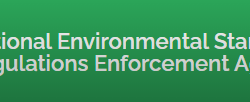
Nigerians are to help NESREA (National Environmental Standards and Regulations Enforcement Agency) in the protection and development of the environment, biodiversity conservation and sustainable development of Nigeria’s natural resources in general and environmental technology including coordination, and liaison with, relevant stakeholders within and outside Nigeria.

Where do I report environmental violations?
To NESREA (National Environmental Standards and Regulations Enforcement Agency)
View their addresses here > NESREA offices.
or
Send a mail to dg@nesrea.gov.ng
What are the powers of NESREA?
The Agency has powers to prohibit processes and use of equipment or technology that undermine environmental quality;
conduct field follow-up of compliance with set standards and take procedures prescribed by law against any violator;
subject to the provision of the Constitution of the Federal Republic of Nigeria, 1999, and in collaboration with relevant judicial authorities establish mobile courts to expeditiously dispense cases of violation of environmental regulation.
Environmental violations include but are not limited to:
• Building under construction generating noise, dust with labourers working late into the night.
• A factory within residential area causing noise, bad odour or discharging untreated effluent.
• Illegal dumping of soil from construction sites.
• Illegal dump sites within residential area, on the road, along the river, e.t.c.
• Indiscriminate dumping \or accumulation of hazardous waste (such as biomedical/ hospital waste, batteries, waste oil, e-waste, scrap metal and asbestos).
• Open air burning of waste.
• Discharge of sewage into the environment.
• Air pollution / emissions from industries.
• Noise pollution from clubs, churches, mosques, house parties, road shows, public transports.
• Noise and excessive vibrations from blasts in quarries particularly without notification.
• Excessive noise and vibrations from factories and industries.
Incidence of blocked/ diverted a river.
• Abandoned quarry.
• Indiscriminate felling of trees.
• Chemical spill on the ground or into water.
• Exposure of workers to heavy metals without personal protective equipment.
• Car wash and mechanic workshop within residential areas.
• Construction sites without caution signs.
• Illegal mining.
• Unpermitted dredging or filling of waters and wetlands.
• Destruction of wetlands.
• Dumping of waste into oceans, streams , lakes or rivers.
• Importation of e-waste (e.g plastic waste, e-waste, paper waste, e.t.c).
• Illegal trade in endangered species of wild fauna and flora.
• Emission from vehicles and power generators.











